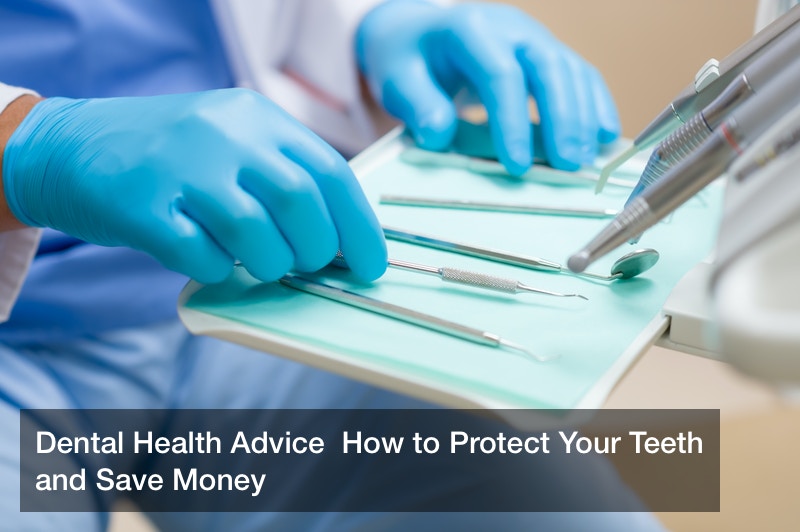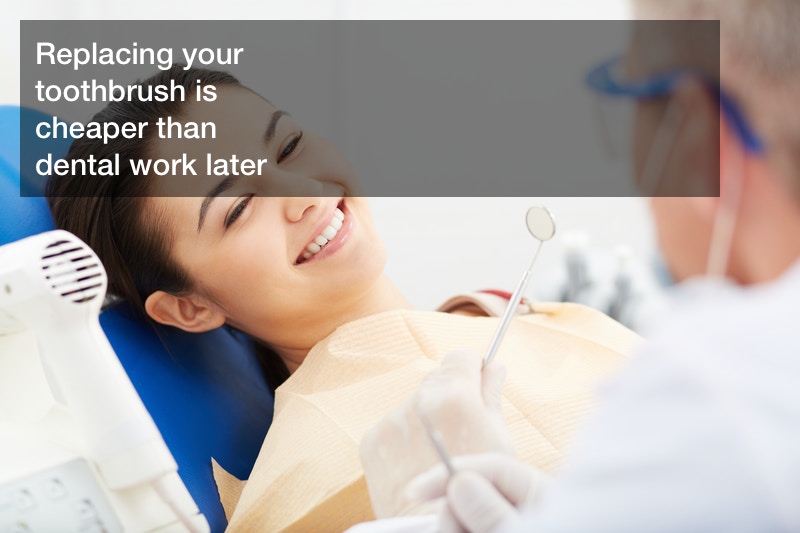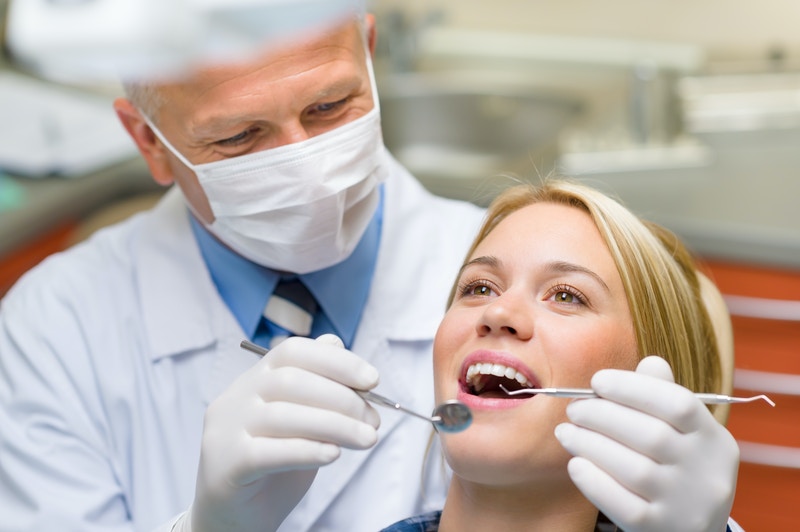
Dental procedures are part of everyday life, and they can end up being costly and piling up if you neglect your dental health. Dental procedures are necessary, however, in order to prevent dental issues from getting out of hand. Some of the most common dental issues can be prevented by simple lifestyle changes including diet and daily hygiene. Other dental issues are caused by accidents, age, and even things such as drug and alcohol use. Luckily, it’s easy to make changes and follow simple dental health advice in order to preserve dental health, overall health, and save money.
Cost of Dental Procedures
It can be easy to neglect your dental health. Though things such as toothpaste, toothbrushes, mouthwash, and floss aren’t expensive, failing to use them every day can lead to some pricey consequences. The average amount of simple at-home teeth whitening can be up to 350 to 500 dollars. In-chair dental whitening can cost up to 800 dollars, and this is just for simple whitening! Unfortunately, if you’re one of the 27.5 million Americans that don’t have health insurance, these prices must be paid in full. It’s no wonder over 80% of Americans are in debt. It’s also no wonder why $45 billion of American debt comes from medical collections.
The Solution
Like with any medical or health condition, preventive medicine, and preventive practices are key to overall good health. If you don’t have a steady oral hygiene routine, it’s time to start to develop one! Like all habits, a good dental hygiene routine shouldn’t take more than 3 months to master and really imprint on your daily schedule. Following these 15 simple dental health advice tips can be simple and easy to start. Talk to your dentist about any concerns, and use these tips to help you save money on procedures and dental appointments later on.
1. Brush at Least Twice a Day
Brushing is the best way to prevent built-up tartar and plaque from forming on teeth. General dental health advice by the Centers for Disease Control states that one should brush their teeth at least twice a day. The best option, however, is to brush three times a day, or after every meal- that is breakfast, lunch, and dinner. This helps prevent bacterial growth from accumulating on your teeth. However, keep in mind to wait one hour after eating to brush your teeth. Brushing before that can damage your teeth enamel. Regular brushing can help keep your teeth white also, and prevent you from having to get dental cleanings that can be costly.
2. Use an Electric Tooth Brush
It can be difficult to brush your teeth properly, especially if you have issues with your hands such as arthritis or carpal tunnel that make it difficult to brush. Sometimes, a manual toothbrush just isn’t doing the job cleaning your teeth, and you need something more powerful. Electric toothbrushes are a great investment and should be used if you can afford to do so. The best dental health advice is to replace electric toothbrush heads every 12 weeks. Using an electric toothbrush has been shown to reduce gum disease and inflammation, tooth decay, and even tooth loss.
3. Get Braces Early On
It’s easier to receive orthodontic treatments as a child, as teeth are more easily able to adapt to changes. However, many times families and young adults can’t afford braces, much less the dental visits it takes to adjust braces. However, even if you can’t get braces early on, getting braces for adults is still a good option to prevent other dental problems. Dental problems that arise from having crooked teeth are tooth decay, gum disease, and even headaches and earaches. Some of the best dental health advice is to get braces as soon as you can. Adult braces are becoming more and more common, and more options such as Invisalign and ceramic braces are now available.
4. Floss Everyday
There’s a phrase that dentists use to describe how often to floss- only floss the teeth you plan to keep. The best, and possibly simplest, dental health advice to follow to prevent costly issues later on is to floss every day. Flossing might be painful when you’re not used to it and can even lead to bleeding gums if you have gum disease. However, after you continue to floss, your teeth will clear out any tartar or plaque build-up and reverse the effects of gum disease- such as bleeding gums. It’s important to use floss that won’t break apart, and if necessary, double up on floss. If you have crooked or crowded teeth, flossing can be challenging. However, you must make an effort to floss your teeth and get every nook and cranny.
5. Don’t Use Hard Water
Hard water is another word for tap water that usually comes out of your sink or shower. Many times, it’s simple to fill up a cup of water and rinse your mouth and teeth with it. Though tap water has fluoride, which can be good for teeth, some people don’t like the idea of rinsing with chemicals. Hard water also has minerals that, over time, can turn your teeth yellow. In order to prevent your teeth from turning yellow, using water softeners can help turn your hardwater into filtered soft water.
6. Don’t Skip Appointments
Going to the dentist can be scary, especially as a child. However, if you’re under your parent’s insurance, take advantage of going to the dentist and not skipping out on dental or doctors appointments. By keeping up with regular appointments, it will be easier to stay on top of your dental health, and catch issues before they arise. If these aren’t dealt with sooner than later, you could have to pay way more to fix preventable issues later.
7. Avoid Sugary Foods
One of the best pieces of dental health advice is to avoid eating too many sugary foods. Sugary foods cause cavities to form, and cavities can be painful and cause many trips to the dental office. Bacteria in your food are fed off of sugar, and after a while, cause tooth decay to form after building up. If you eat too much sugar, you’re constantly feeding these bacteria and helping them to stay alive. Though brushing your teeth, flossing, and using mouthwash can help minimize the effects of cavities, constantly eating sugar will just invite more cavities to form. In addition, consuming sugary foods can lead to diabetes, which itself can cause dental and overall health issues. A simple lifestyle change such as cutting back on sugar can go a long way in helping your dental health improve.
8. Avoid Starchy Foods
Just like sugar, bacteria in your mouth can break down starch and form cavities this way. Starch is similar to sugar, and when it is broken down, acts the same way as well. Foods that contain a lot of starch include potatoes, rice, bread, and breakfast cereals among others. A healthier choice that’s easier on your teeth is to eat foods with complex carbs and starches, such as brown rice and wheat products. Comfort food that is usually starchy can also be replaced with healthy complex carbs as well. By doing so, you reduce the risk of getting cavities, and also insulin spikes that can hurt your health overall!
9. Start Habits Early
Most of the habits we form as a child follow us into adulthood. From birth to age five, a child’s brain is developing exceptionally fast, and information is being retained as are habits. This is great news for teaching kids the importance of dental health. Some good dental health advice for children is not just to visit the childrens dentist often, but also to floss and brush early. Flossing can be done as soon as two teeth are touching! Though you should always help a child brush and floss, flossing can be done alone by around age six or seven. If you’re able to keep up with this, you’ll save plenty of money down the line.
10. Replace Tooth Brushes Often
We mentioned earlier getting electronic toothbrushes to help aid you when brushing your teeth. But, manual toothbrushes work just as well, and are super cheap and easy to use. However, many of us might forget to replace toothbrushes often. Some good dental health advice is to replace your toothbrushes every three to four months. Not replacing your toothbrush leads to frayed bristles, which are less effective at removing plaque and tartar build-up. Not replacing your toothbrush can also spread infection. It’s important to keep your toothbrush away from outside bacteria, such as germs that can spread from toilets, and if possible cover them as well.
11. Get Immediate Medical Help after an Accident
Accidents are prone to happen at any time in life. However, not getting help after an accident, either from your doctor or hospital, can have serious consequences. The same goes for accidents involving your teeth. If you are hurt in an accident and have chipped teeth, a broken jaw, or any other issues with your teeth, not treating them can cause permanent damage. Even if the issue is cosmetic, getting veneers is a simple fix. Cosmetic issues with your teeth are just as important to treat, as they can have long-lasting consequences such as low self-esteem. Always seek medical help after an accident, and talk to your doctor or dentist for dental help.
12. Don’t Ignore an Abscess
Many of us have felt tooth pain, and it can be easy to dismiss tooth pain as unimportant. However, tooth pain has many causes, and one of the most common is a dental abscess. Dental abscesses can quickly turn serious, and lead to an infection that affects the entire mouth. Not only can an infection cause tooth pain, but it can lead to more serious health consequences such as a fever, fatigue, and even sepsis. If you’re already suffering from a fever, a swollen mouth, and pain, visit your local urgent care or hospital right away.
13. Avoid Tobacco
Tobacco use is one of the worst things you can do to your health. Tobacco use is detrimental to your lungs if you smoke, and also to your teeth either with smoking or dipping. Smoking causes teeth to turn yellow, and can increase the number of bacteria in your mouth leading to tooth decay. Dipping is the practice of putting tobacco packs consisting of chewing tobacco between your lips and teeth. This can lead to serious health effects, such as oral cancer. Stopping tobacco use is one of the best things you can do not just for your teeth, but quality of life in general. Lots of options are available now for smoking cessation, including therapy, nicotine replacement, or even stopping cold turkey.
14. Keep Your Mouth Hydrated
Bad breath can have many causes, from a tooth infection to poor eating habits. However, the biggest cause is having a dry mouth, and it’s a relatively simple fix. You can help prevent problems that arise from dry mouth by simply hydrating. However, it’s important to use water to hydrate as opposed to sugary drinks that can cause more harm than good. It can be difficult to keep your mouth hydrated if you’re taking medications that cause dry mouth. Talk to your doctor about side effects from medication that make it difficult for you to swallow. Some issues that can also cause dry mouth are smoking and nerve damage. Some dental health advice is to drink lots of water, and use mouthwash as well to keep your mouth hydrated and prevent issues such as tooth decay.
15. Wean Children Off Bottles
It can be a difficult process to wean children off bottles. One of the best dental health advice tips to follow is to wean children off as early as possible, and also prevent thumb-sucking in children. The reason for this is because studies have shown that weaning children late off of bottles and thumb-sucking can lead to crooked teeth in adulthood. As mentioned above, crooked teeth can not only lead to braces, but issues such as trouble flossing and excess plaque build-up. More importantly, crooked teeth can cause issues chewing, which can cause TMJ pain. A simple fix for this is getting orthotics services that can allow for a balanced jaw muscle system and alleviate TMJ symptoms.




